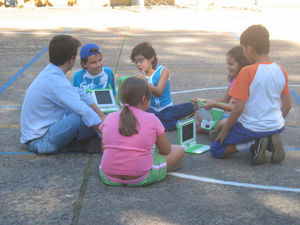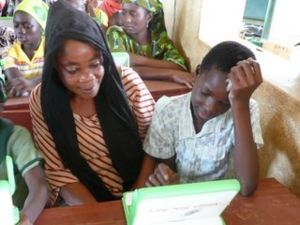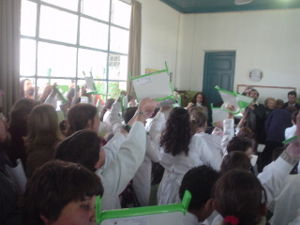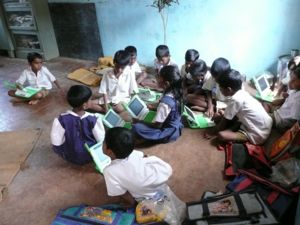Educators: Difference between revisions
No edit summary |
|||
| Line 7: | Line 7: | ||
Moreover, with mobile, connected laptops the walls of the classroom open and the entire community becomes the classroom and virtually the whole world enters on demand. The children carry the classrooms and teachers of the world with them through the community and into their homes. Children can participate in the study of global issues while simultaneously using local context for understanding. They can fully participate as producers of knowledge and not just as consumers of materials produced by others. |
Moreover, with mobile, connected laptops the walls of the classroom open and the entire community becomes the classroom and virtually the whole world enters on demand. The children carry the classrooms and teachers of the world with them through the community and into their homes. Children can participate in the study of global issues while simultaneously using local context for understanding. They can fully participate as producers of knowledge and not just as consumers of materials produced by others. |
||
You can follow the work of the learning team on the OLPC blog: laptop.blog.org, or below: |
'''You can follow the work of the learning team on the OLPC blog: laptop.blog.org, or below:''' |
||
== Getting Started == |
== Getting Started == |
||
Revision as of 10:55, 21 July 2009
Welcome
One Laptop per Child is an education project, not a laptop project. With connected laptops, learners are liberated to actively engage with others with similar interests in cultures of learning by doing without being limited by time or space. In this way children can learn by teaching, actively assisting other learners and thereby liberating the teacher to focus her experience and expertise where most needed. Computers also facilitate appropriation of knowledge in domains difficult to comprehend with other static, non-connected materials. Teachers benefit as well as not only do they get to use the laptops at home for their own learning, but the connected laptop becomes a conduit for customized professional development enabling the teachers to gain access to expertise and colleagues, to pose and respond to practical questions.
Moreover, with mobile, connected laptops the walls of the classroom open and the entire community becomes the classroom and virtually the whole world enters on demand. The children carry the classrooms and teachers of the world with them through the community and into their homes. Children can participate in the study of global issues while simultaneously using local context for understanding. They can fully participate as producers of knowledge and not just as consumers of materials produced by others.
You can follow the work of the learning team on the OLPC blog: laptop.blog.org, or below:
Getting Started
Emergent Design by Dr. David Cavallo, VP of Learning, OLPC
"Need for high quality education" by Dr. David Cavallo, VP of Learning, OLPC
"Need for high quality education, part 2" by Dr. David Cavallo, VP of Learning, OLPC
OLPC Learning Guide by OLPC Learning Team
Learning Overview by Juliano Bittencourt for OLPCorps teams
How to get involved?
- Read about the OLPC Learning Vision to learn more about why we think children in developing countries need laptops and what we think laptops will enable them to do.
- Familiarize yourself with our ideas about content and collaboration, and the various Creative Commons licenses. As a rule, we want educational materials produced for and connected with OLPC to be free and open source.
- Visit our Contributors program page.
- Create an account on the OLPCWiki!
- Visit our sister organization, Sugar Labs and join their wiki.
- Add yourself, or your organization, to the educator Roll Call page.
- Add an educator user box to your user page, which will add you to Category:Educators.
- Create an educational organization page for your organization, group, or school.
- Find a project that excites you.
Contribute content
- Read about the content repository that will reside on the school servers.
- Add to the list of ideas for content that should be included in the repository.
- Contribute your content directly to OLPC by following these instructions.
Create activities
- Read the educational activity guidelines to learn about the features of the XO that pertain directly to educators.
- Explore our repository of activity outlines and lesson plans.
- Contribute to our collection of story-based learning activities.
- Create a new activity, either based on one of our sample learning activities or entirely from scratch.
Trial schools
| Porto Alegre OLPC Brazil |
Galadima OLPC Nigeria |
Ban Samkha OLPC Thailand |
|---|---|---|
File:Hiking02.jpg Ban Samkha is a rural village in northern Thailand | ||
| Cardal OLPC Uruguay |
Arahuay OLPC Peru |
Khairat school OLPC India |
"Pupils go even beyond what I can teach in the class. It's a very interesting thing to use. I personally have a better idea about teaching... We discovered that giving them time to discover something and to do it in their own way, they feel more happy and they are so excited in using it that, 'Yes, I discovered it! Yes, I can get it!! Yes, I can do this on my own!!!' Teaching is getting more interesting and less stressful." — Mr. O., Galadima School, Abuja, Nigeria
Schools who want to work with XOs in the classroom (and don't yet have any) should go to Interested schools.




